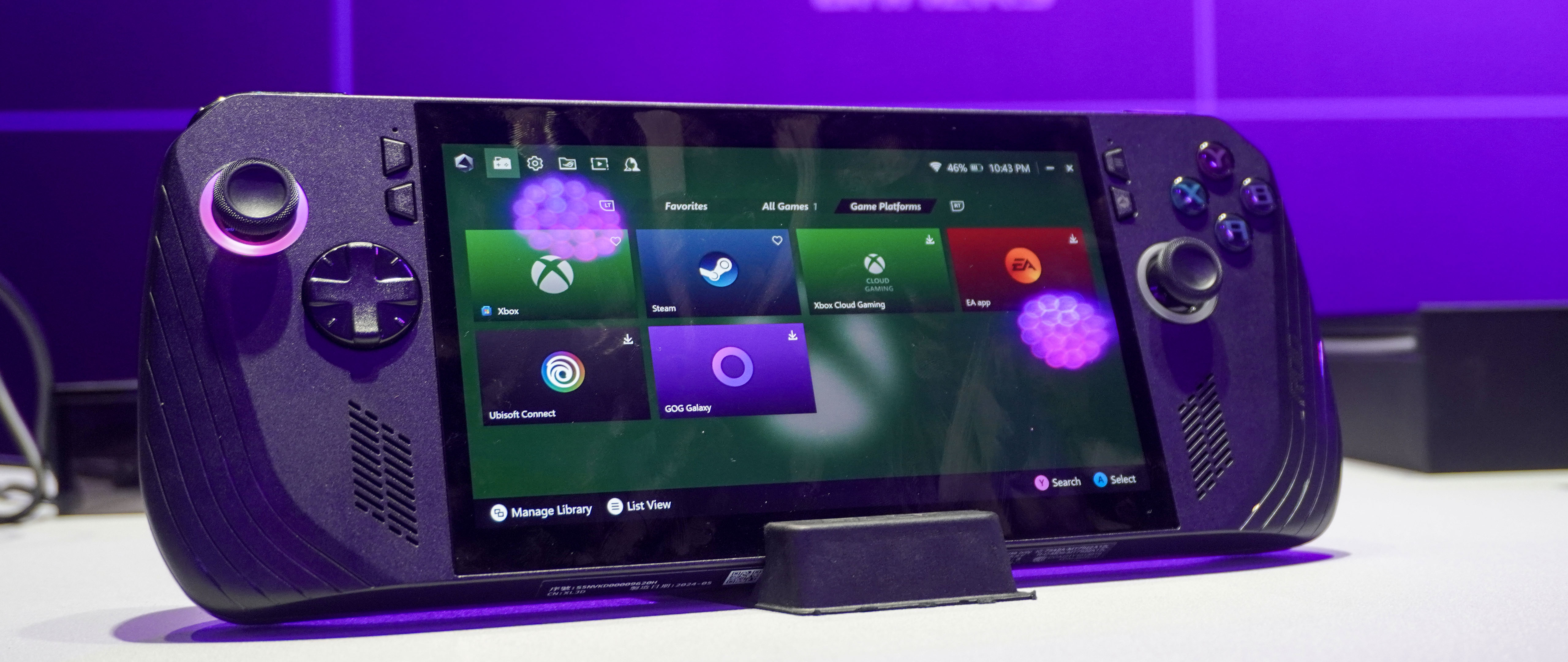Tom's Guide Verdict
For a minor upgrade, the Asus ROG Ally X’s small tweaks feel like more of a major update — fixing our biggest gripes with the first generation Ally. Now if only we can get a version of Windows 11 that is actually useful on a gaming handheld.
Pros
- +
Improved performance
- +
Vastly improved ergonomics
- +
Much better battery life
- +
Armoury Crate is getting better as an overlay…
Cons
- -
…but Windows 11 is the enemy of handheld gaming
- -
Give us OLED
- -
Expensive at $800
Why you can trust Tom's Guide
I’m doing my best to hold in the many DMX references I can make when talking about the $799 Asus ROG Ally X, as I know “X gon’ give it to ya” will be a very regularly used quip in many reviews. So let me cut to the chase — yes, Asus has improved the battery life, made it faster, and improved the ergonomics (despite the weight increase). This is the best Windows gaming handheld.
Where others falter, X thrives. Doubling that battery capacity to 80Wh gives it a stamina you’re a lot less worried about while out and about, while the addition of a second USB-C port means you can charge while using a pair of AR glasses like the Viture Pro. This puts it cleanly ahead of the Lenovo Legion Go and the original Ally.
With the same chip and display as last year’s handheld, performance gains are minor but definitely still noticeable because of that full-size SSD and doubling in RAM that seems to improve loading speeds and framerate smoothness.
And with the small gains in size and thickness, Asus has improved the ergonomics too — shoulder triggers have a lovely amount of travel, face buttons feel more tactile and the joysticks are so much better.
But what about going up against the mighty Steam Deck OLED? This is where things get tricky, because it cuts to the core of the problem with all Windows gaming handhelds. Namely, Windows 11 itself.
Asus has done a good job trying to work around it with Armoury Crate, but using this OS on a tiny display is still essential for setting up games and…well…it sucks. SteamOS is a way better handheld console experience, and for the pure gaming experience, the stellar controls and gorgeous display make this a close tie between the two.
So at $799, this is a steep purchase decision to make, but Windows warts and all, you’re getting the best in class here. If you already have the Ally, the Legion Go or Steam Deck, this is not worth the upgrade.
However, if you’ve been looking for a gaming handheld and don’t want to be “constrained” to Steam (using that word loosely because let's be honest, you all probably use Steam mostly), then the ROG Ally X is the one to buy.
Asus ROG Ally X: Cheat Sheet
- What is it? This is a Windows gaming handheld — an upgraded version of the original Asus ROG Ally.
- Who is it for? This is for gaming enthusiasts who want to take their PC library with them, without the need for a chunky gaming laptop.
- What does it cost? You can pick one up for $799.
- What do we like? Asus has listened and fixed a lot of the issues we had with the original Ally. Battery life is much better, it feels much more comfortable to play games on, and performance has been improved a little too.
- What don’t we like? In the face of the Steam Deck OLED, I’m a little sad that the Ally X didn’t get the OLED treatment. And unfortunately, there seems to be no way of getting away from the plight that is trying to use Windows 11 on a tiny display.
Asus ROG Ally X: Specs
| Dimensions | 11 x 4.4 x 1.5 inches |
| Weight | 1.49 pounds |
| CPU | AMD Ryzen Z1 Extreme |
| GPU | AMD Radeon Graphics |
| RAM | 24GB LPDDR5x |
| Storage | 1TB PCIe Gen 4x4 SSD |
| Display | 7-inch FHD, 16:9, 120Hz refresh rate IPS panel |
| Ports | 1x USB 4 Type-C, 1x USB 3.2 Gen 2 Type-C, 1x 3.5mm audio jack, 1x microSD card reader slot |
| Wireless connectivity | Wi-Fi 6E and Bluetooth 5.2 |
| Price | $800 USD |
Asus ROG Ally X: The ups
I’ll sum up what’s good about this system in three words — Asus has listened. We all had quarrels with the original ROG Ally, and while this definitely isn’t a next-generation system, this beefed-up edition tackles (mostly) all of our problems.
Stamina champ
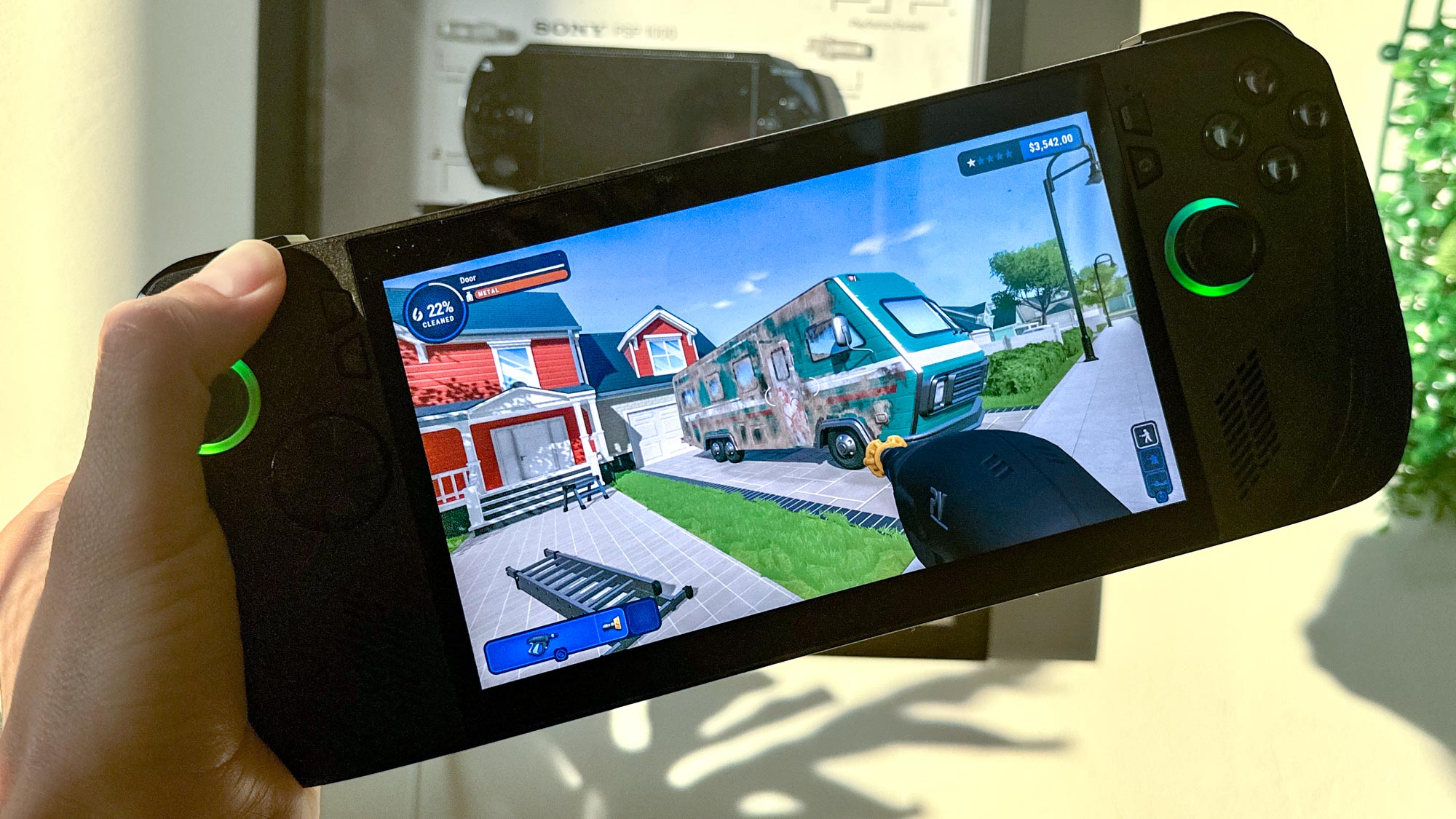
Asus seems to have taken our complaints about battery life personally, as the ROG Ally X doubles the capacity to a massive 80Wh cell, while managing to not add that much weight to the system (more on that later).
And while doubling the size of the battery doesn’t translate to double the longevity, there’s certainly a lot more here where I don’t worry about it on longer journeys.
| Device | Battery life hh:mm (Gaming PCMark 10) |
|---|---|
| Asus ROG Ally X | 03:04 |
| Lenovo Legion Go | 01:59 |
| Asus ROG Ally | 01:43 |
This is a marked improvement that means I could easily go from Nottingham to London on a two-hour train while riding around in “Red Dead Redemption 2,” and see battery life drained to around 20%. It’s unheard of in gaming handhelds.
Plus, if you are traveling for longer, the addition of a second USB-C port means that if you are using an accessory like AR glasses, you can still charge and play. Pretty neat!
Much more performant
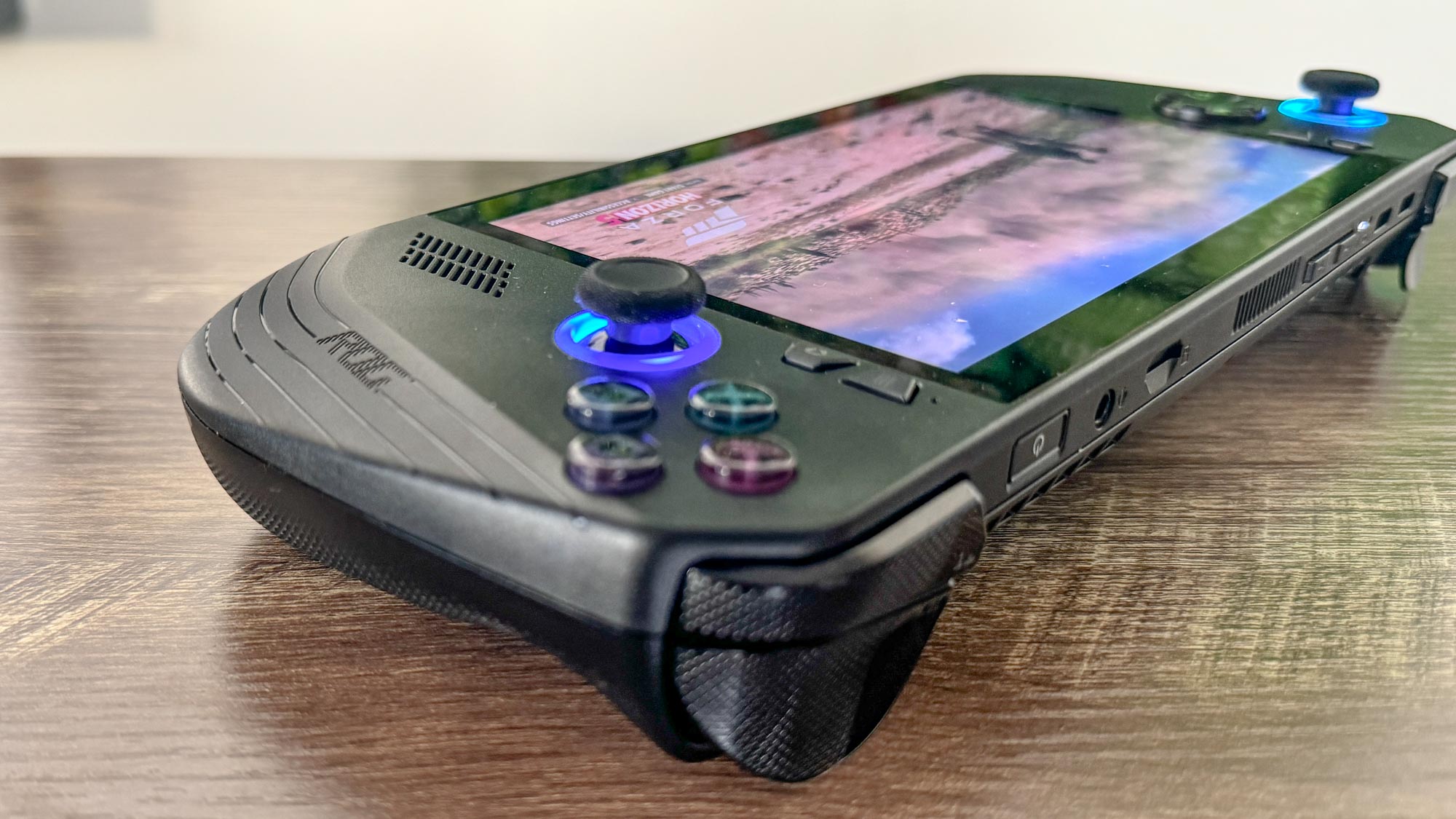
So yes, this is still using the AMD Ryzen Z1 Extreme processor, so in terms of gaming performance, the changes are incredibly minor. But there are three key things at play here that do indeed improve performance.
- Improved cooling helps with better sustained performance
- Upping the RAM to 24GB helps a little with framerate smoothness
- Having a full-size SSD in here (rather than the half-size of the ROG Ally) has dramatically sped up loading times
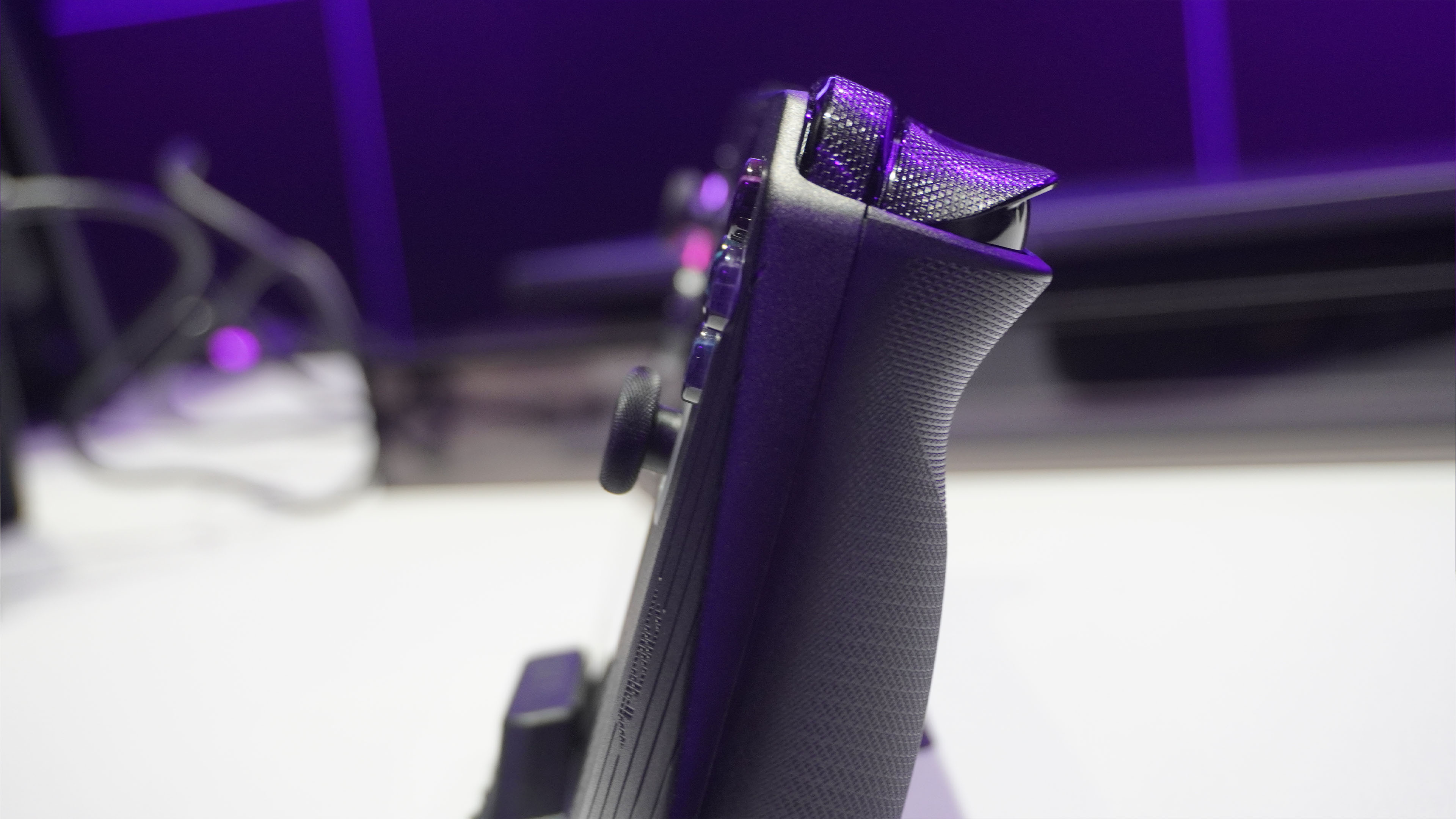
See for yourself:
| Device | Geekbench 6 Single core | Geekbench 6 multi-core | SSD transfer speed (MBps) |
|---|---|---|---|
| Asus ROG Ally X | 2565 | 11085 | 1345.9 |
| Lenovo Legion Go | 2062 | 9627 | 1432.1 |
| Asus ROG Ally | 2468 | 11041 | 769 |
As you can see, a small bump in the CPU performance, but look at that bump in disk speed — much more in line with the Legion Go! That’s going to help with loading up dense maps like in “Cyberpunk 2077.”
| Device | Asus ROG Ally X | Lenovo Legion Go | Asus ROG Ally | Steam Deck OLED (720p) |
|---|---|---|---|---|
| Cyberpunk 2077 (Ray Tracing: Ultra) | 9.6 FPS | 7.9 FPS | 4.5 FPS | n/a |
| DiRT 5 | 30.9 FPS | 41 FPS | 45 FPS | 41 FPS |
| Shadow of the Tomb Raider | 36 FPS | 23 FPS | 26 FPS | 44 FPS |
Since we use the testing standards we normally apply to laptops, these frame rates may look terrifying (and DiRT 5 does stand out here). But it comes down to channeling your inner PC gaming nerd and tweaking for perfection. Taking Cyberpunk 2077 down to medium settings and engaging FidelityFX Super Resolution (FSR) got me a rock solid 40 FPS for example.
And the improved cooling system means you’re not going to see those frames dip no matter how long you play. “Forza Horizon 5” on medium settings at 1080p with FSR gets you 50 FPS, but you can bet your bottom dollar that it goes down to 30 after an hour on the original Ally. That doesn’t happen one iota with the X.
| Device | Hottest surface temperature while gaming (in fahrenheit) |
|---|---|
| Asus ROG Ally X | 95.4 degrees |
| Lenovo Legion Go | 111.5 degrees |
| Asus ROG Ally | 115 degrees |
The upgrades have made a decent improvement here, put simply.
The controller tweaks hit hard
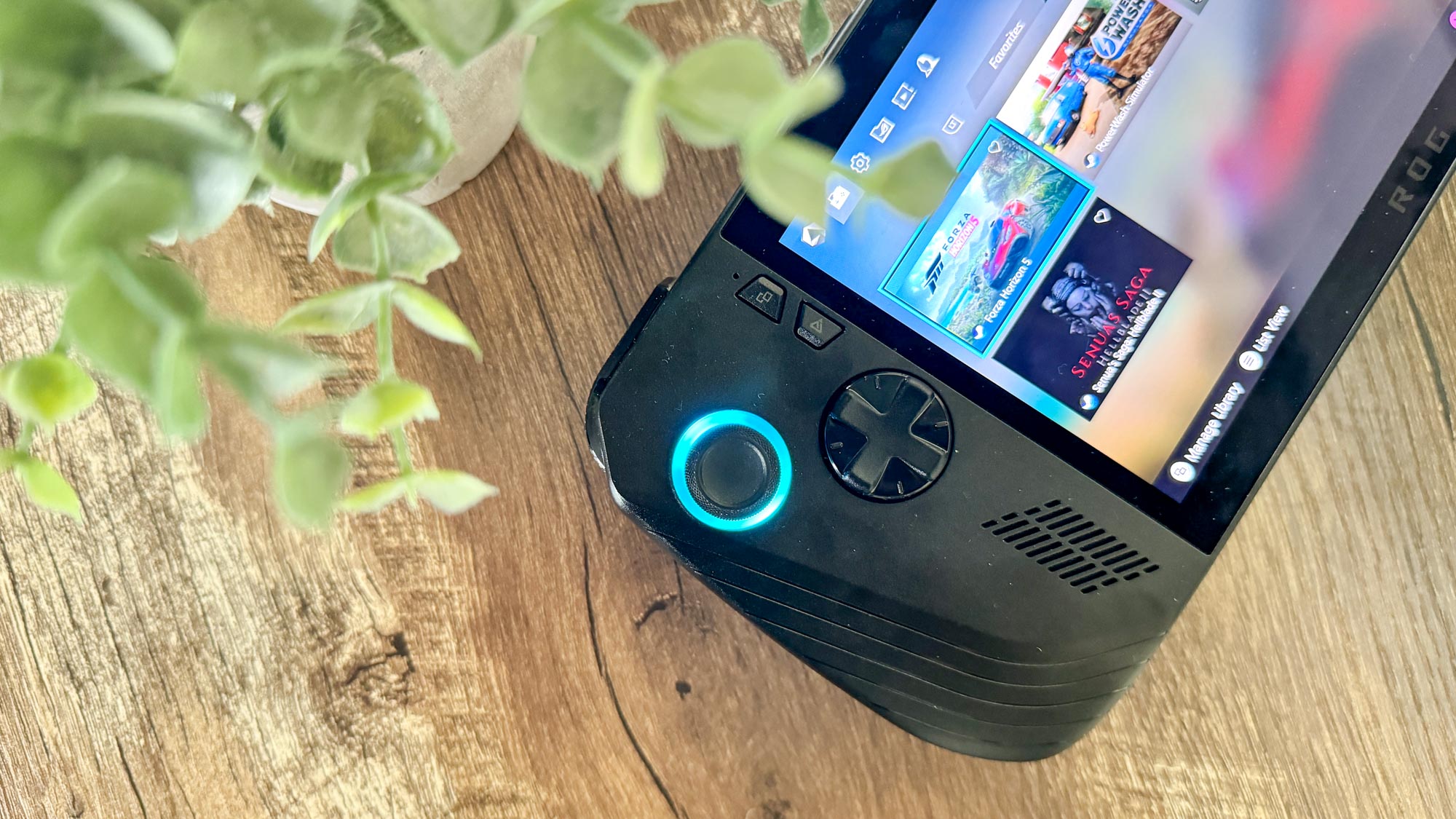
I’m just going to put the table here without context, as I bet you’re expecting this to be much chunkier and heavier with its doubled-up battery. Well, you’re wrong.
| Device | Dimensions | Weight |
|---|---|---|
| Asus ROG Ally X | 11 x 4.4 x 0.9 inches | 1.49 pounds |
| Lenovo Legion Go | 8.27 x 5.15 x 0.79 inches | 1.88 pounds |
| Asus ROG Ally | 11 x 4.4 x 0.5 inches | 1.3 pounds |
It’s really surprising to feel how this is still perfectly fine to play in your hands with no real wrist strain whatsoever. Hats off to the designers for pulling this off!
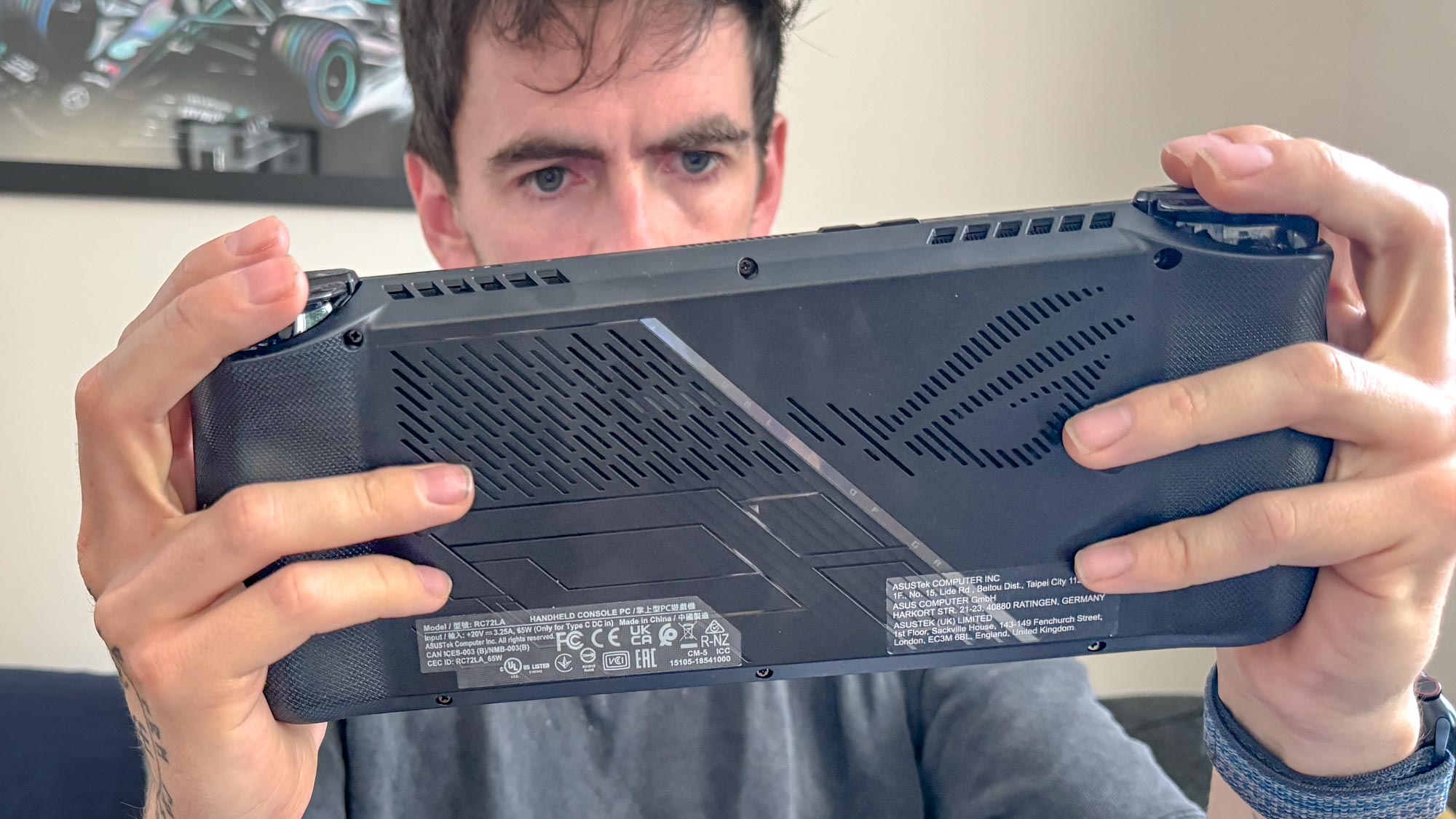
But with the increased thickness, Asus managed to address some of my other gripes with the Ally. The grips are more pronounced and the back buttons are smaller, so there isn’t any chance of unintended presses. The triggers feel smoother and have more depth to them. Those face buttons and the D-Pad have a far nicer tactile feel to them. And the joysticks feel much smoother and durable too.
Oh, and the black finish is seriously suave and won’t fall victim to any discoloration like the white of the original did. All-in-all, I’m impressed.
Asus ROG Ally X: The downs
One of these seems to be an oversight on Asus’ part, and the other is out of the company’s control. For Windows gaming handhelds to actually be good, we need a good gaming handheld version of Windows.
“No, I don’t want Office 365 on a damn handheld!”
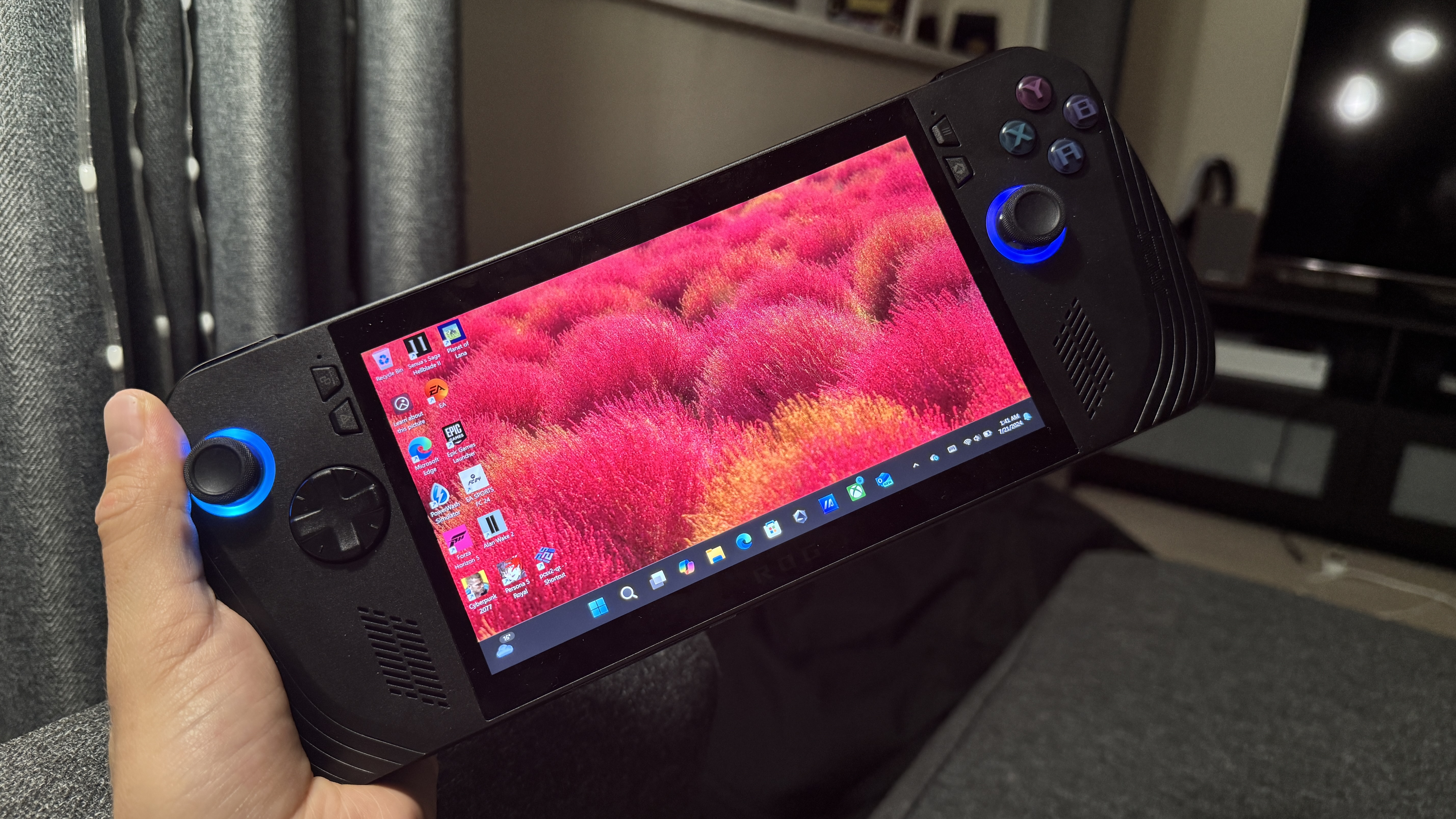
I could go on for years about how awkward it is to navigate Windows on a tiny touch screen, using the analog stick to move the mouse cursor or your finger to accidentally open the wrong app next to it. These are things we’ve gone in on for every handheld device that sports Redmond’s desktop OS.
And to be fair to Asus, the company is trying real hard to keep you away from that dumpster fire. Armoury Crate opens on start-up and it's a slick, simple console-esque overlay that displays your entire games library and offers you plenty of system customizability. But alas, you’re never too far away from it — needing to install the games in the first place.
Microsoft desperately needs to build a gaming handheld-centric version of Windows 11. I don’t care whether it has a silly name like “Windows 11: Gamer Edition” or “XboxOS,” but we need it now because this isn’t a solution.
Nothing makes that more obvious than going through Windows 11 startup and being offered a free subscription offer for Office 365… Who in the blue hell wants Office on a handheld!? If this is what we can expect from the much-rumored Xbox Gaming Handheld, we’re in a lot of trouble. Microsoft needed to take action a year ago, and now my patience is wearing very thin.
Gimme some OLED
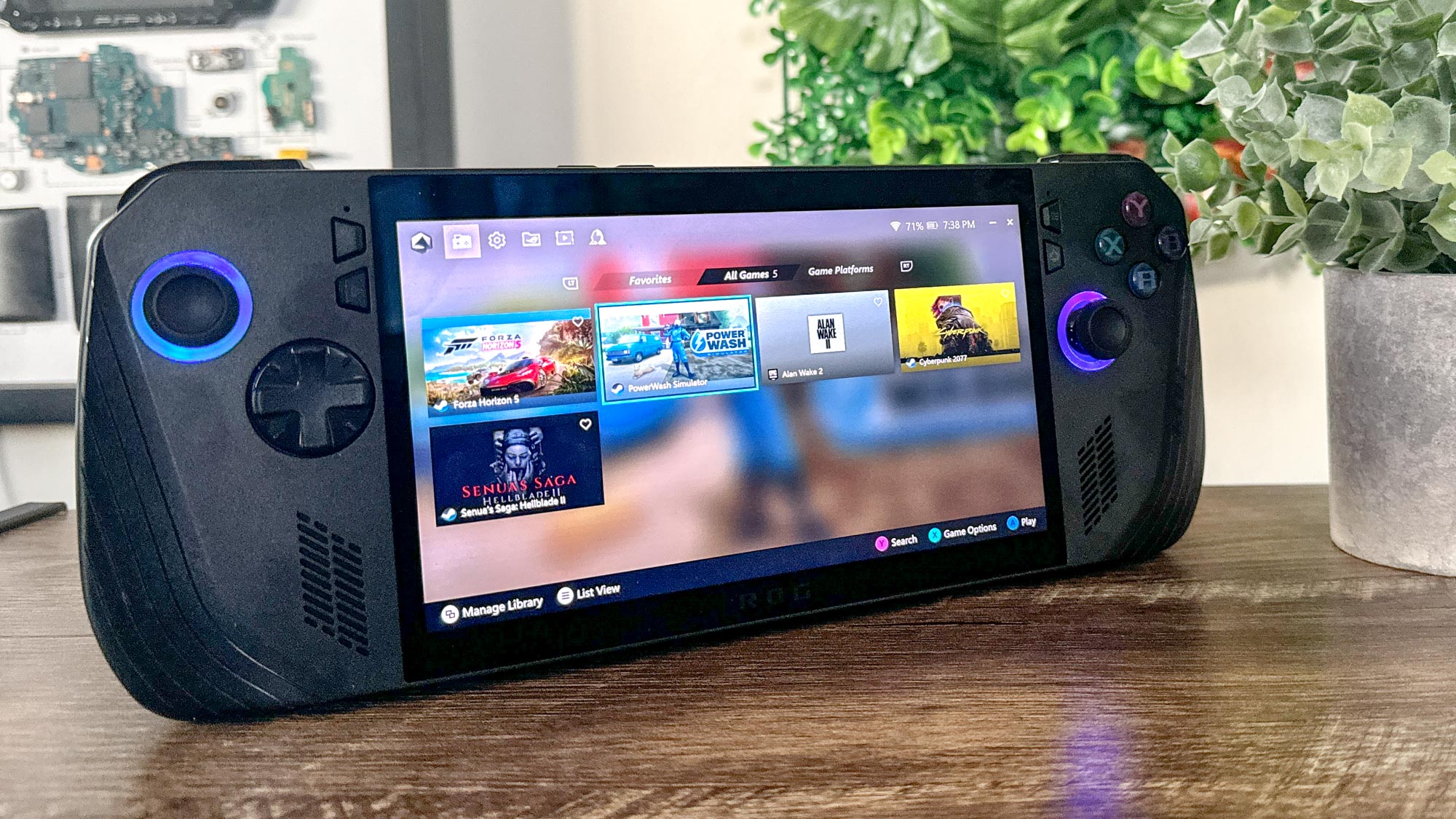
The 7-inch FHD IPS display is nice, don’t get me wrong. But it’s not “OLED” nice, and you’d think that for $800, the company that is stuffing these gorgeous panels into the vast majority of its laptop line (even models that are cheaper than the ROG Ally X) could make it happen.
It’s perfectly serviceable for gaming with a decent brightness to tackle outdoor lighting conditions and plenty of color — subsequently beating out its Windows competition. But come on Asus! It would’ve extended the battery (thanks to not having to light every pixel), made the device slightly lighter, and games would have melted off the screen with vividity. This was an easy catch and you fumbled.
| Device | Brigntness (nits) | sRGB color gamut (%) |
|---|---|---|
| Asus ROG Ally X | 523 | 112.7 |
| Lenovo Legion Go | 477 | 151.8 |
| Asus ROG Ally | 465 | 108.6 |
| Steam Deck OLED | 597 | 143.7 |
As far as PC gaming handhelds go, the Steam Deck OLED stands head and shoulders above in display quality, while costing so much less.
Asus ROG Ally X: Verdict
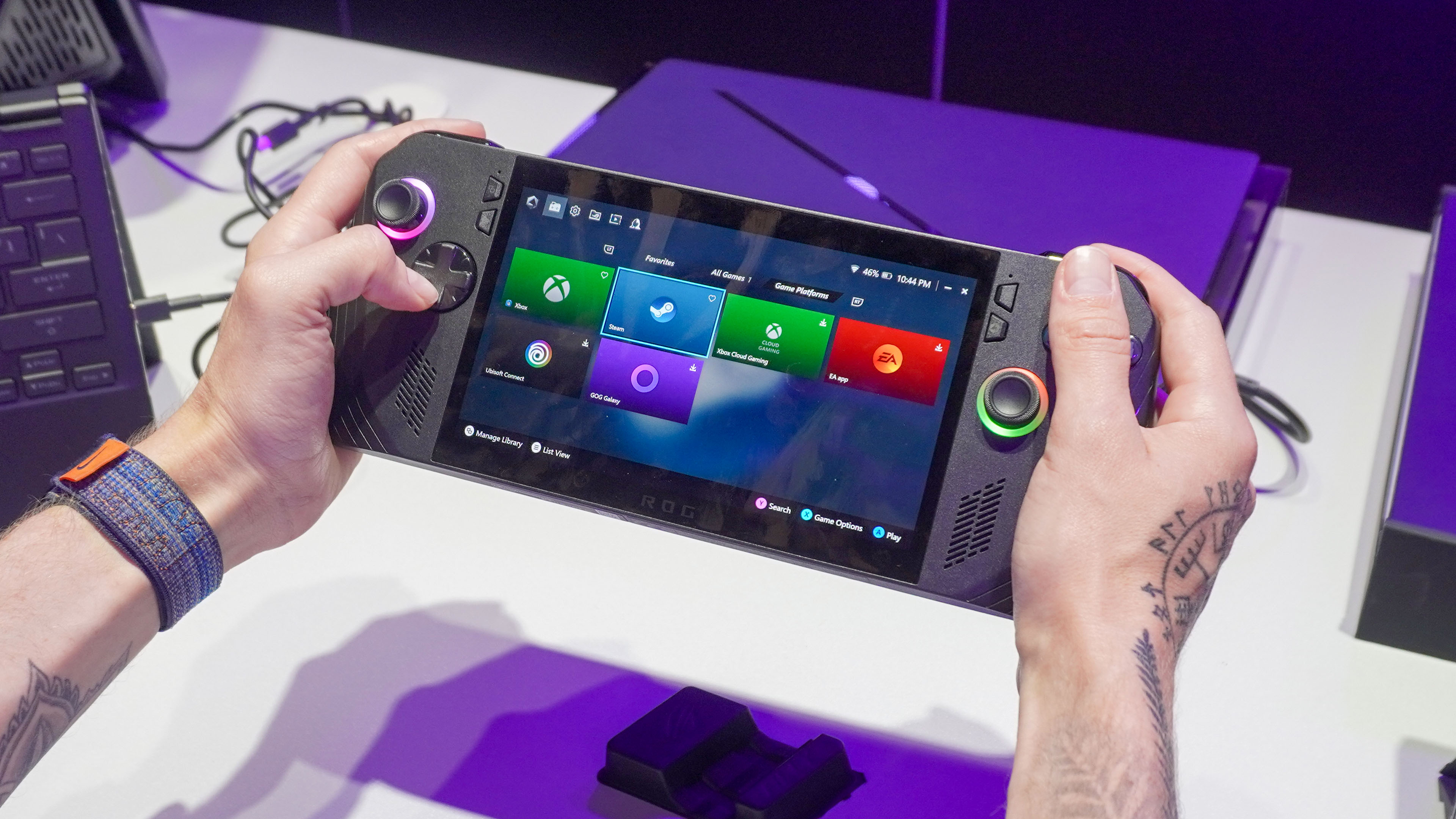
So after successfully avoiding any DMX references, it’s fair to say that with everything taken into account, the ROG Ally X is the best Windows gaming handheld. Microsoft tried damn hard to take that away with a subpar OS experience, but Asus has cracked it.
This is a story of listening to player feedback and responding directly — doubling the battery capacity, upping the RAM for better performance, fine-tuning the ergonomics and making it look a whole lot better in its black finish.
Like I said, if you already have a Windows gaming handheld or a Steam Deck, hold off until the next generation for those more significant internal upgrades. But whether I was on a plane, a train or ignoring the weirdos in the bar by playing games, this mini marvel was able to keep up and keep me entertained.
Because the truth is the ROG Ally X is a blessing to whoever gets to really play it…damn it, I couldn’t resist!

Jason brings a decade of tech and gaming journalism experience to his role as a Managing Editor of Computing at Tom's Guide. He has previously written for Laptop Mag, Tom's Hardware, Kotaku, Stuff and BBC Science Focus. In his spare time, you'll find Jason looking for good dogs to pet or thinking about eating pizza if he isn't already.
